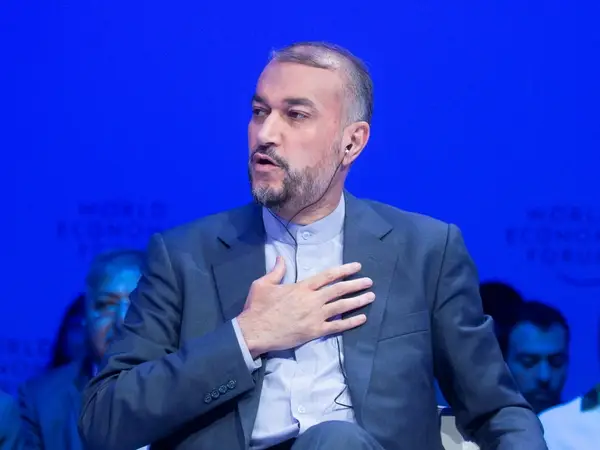A website in Iran has noted that some remarks by Foreign Minister Hossein Amir-Abdollahian this week in Davos were not statements he would have made in Tehran.
In a commentary entitled "Double Standards," the Iranian Diplomacy website, asked whether the new rhetoric by Amir-Abdollahian about obstacles to the revival of the Iran nuclear deal, was tailored solely for listeners in the annual meeting in Davos or it was the outcome of his experiences as foreign minister during the past 9 months.
Amir-Abdollahian, during a conversation with journalist Farid Zakaria in the annual meeting of the World Economic Forum in Davos, Switzerland on May 26, said that hardliners in both Iran and the United States were working against the revival of the JCPOA. He particularly pointed out opposition by hardliners in the Iranian parliament (Majles).
According to Iran diplomacy, Amir-Abdollahian's statement about the Iranian parliament exerting pressure on the government to reject the JCPOA "could mean that the Iranian foreign Minister has two different views about the same issue." The website asked why he did not say the same thing to Iranian media.
However, neither Amir-Abdollahian nor Zakaria mentioned that hardliners are in control of Iran's negotiating team. Chief negotiator Ali Bagheri-Kani is known for his opposition to the JCPOA since the time he served in the team under ultraconservative negotiator Saeed Jalili in early 2010s. He continued to oppose an agreement with the United States until his appointment as chief negotiator by Iran's new government in 2021.
The Iranian foreign minister’s rhetoric about hardliners both in Iran and the United States was also not very different from his predecessor, Javad Zarif’s oft used line of argument, to show that his positions were moderate and those critical of Iran in the West were hardliners.
Meanwhile, the Iranian foreign minister for the first time "strongly condemned the war in Ukraine" without mentioning Russia's role. The Iran diplomacy wrote, "Undoubtedly, the foreign ministry is not courageous enough to make the same statement in Iran." The website also explained that the condemning the war in Ukraine could have been an indirect attack on Russia for its negative role in the talks and taking oil market share from Iran by selling its oil cheaper to China.
However, the website noted that although in many cases, Amir-Abdollahian's statements on Iran's foreign policy followed the party line, in some instances it appeared he got too close to Tehran's red lines.
Amir-Abdollahian, who spoke in Persian throughout the 35-minute conversation looked calmer and on top of the subject matter in most parts of the conversation, unlike his previous international appearances. He sounded like a very good speaker, at least in Persian. His points of weakness were revealed only when he answered questions on relations with Saudi Arabia, which later met with an indirect denial by his Saudi counterpart.
His accusation that the United States did not fight terrorism in Afghanistan and Syria were also not the highlight of this conversation as they were similar to Iranian officials' run-off-the-mill answers to such questions and were devoid of any insight.
Similarly, his statement that "We have intelligence the Zionists have taken US foreign policy hostage," was a repetition of Tehran's ragged argument about the issue throughout the past four decades.
